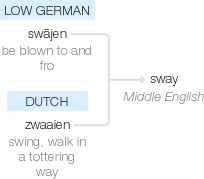Sway
Middle English: corresponding in sense to Low German swājen ‘be blown to and fro’ and Dutch zwaaien ‘swing, walk in a tottering way’.
wiktionary
Earlier swey(“to fall, swoon”), from Middle English sweyen, from Old Norse sveigja(“to bend, bow”), from Proto-Germanic *swaigijaną (compare Saterland Frisian swooie(“to swing, wave, wobble”), Dutch zwaaien, Dutch Low Saxon sweuen(“to sway in the wind”), from Proto-Indo-European *sweh₁- (compare Lithuanian svaĩgti(“to become giddy or dizzy”), the second element of Avestan 𐬞𐬀𐬌𐬭𐬌-𐬱𐬑𐬎𐬀𐬑𐬙𐬀 (pairi-šxuaxta, “to surround”), Sanskrit स्वजते(svájate, “he embraces, enfolds”).
The noun derived from the verb.
etymonline
sway (v.)
early 14c., "move, go, go quickly; move (something) along, carry," probably from a Scandinavian source akin to Old Norse sveigja "to bend, swing, give way," Old Danish svegja, perhaps merged with an unrecorded Old English cognate. The whole group might be related to swag (v.) and swing (v.).
The sense of "swing, waver, move in a swaying or sweeping motion" is from late 14c. Meaning "move from side to side" is from c. 1500; transitive sense "cause to move from side to side" is from 1550s (according to OED, not common before 19c.). Figurative sense "cause to be directed toward one side, prejudice" is from 1590s. Related: Swayed; swaying.
sway (n.)
c. 1300, "movement from side to side," from sway (v.). The meaning "controlling influence" (as in to be under the sway of) is from 1510s, from a transitive sense of the verb in Dutch and other languages.
